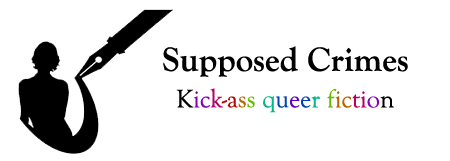
There's been some furor (and some confusion) over the recent 4Chan-initiated "drop the B" fake campaign. While this particular time there isn't a real initiative to eliminate bisexual from the LGBTQIA+ lexicon, it's evoked a lot of feelings.
It would be easy to laugh it off and dismiss it as right-wing trolls being their usual haterly selves if it weren't for some hard reality. The truth is, that campaign was borrowed from the actual experiences of bisexual people.
The fake campaign rested on the premise that bisexuality is inherently transphobic. That's not a new sentiment. People both inside and outside the community have encouraged folks to identify as anything but bi, and some have used "it's transphobic" as the method. (Without, may I add, consulting any actual trans people on it.)
There's an ongoing belief that bisexuality is in itself a problematic orientation. For decades, there's been stigma attached to it. Bisexual people are believed to be liars, cheaters, incapable of stable and loving relationships, disease vectors, secretly straight or secretly gay, sexually insatiable, mentally unbalanced, and more. Adding transphobic to the list wasn't much of a stretch once people could be convinced that pansexual was a more "enlightened" version. (Note: this is NOT pansexual people responsible for that misery, and in no way do I believe pansexual people should be attacked or disparaged for it.)
Even professionals who should know better are ignorant about bisexuality and sometimes prefer to stay in the dark. Today, I learned that therapists coercing their clients into identifying as straight or gay falls under the broad category of conversion therapy (attempting to change a person's sexual orientation).
The sad truth is that antagonism toward bisexuality, the word bisexual, and bisexual people shows up in all kinds of places, including the literary world. We need to do better in our books because right now, dropping the B is an all-too-common habit in queer literature. Some ways it shows up:
- The "gay for you" trope (a formerly heterosexual person enters a relationship with a same-gender partner and is suddenly "gay now")
- Refusing to use labels or identities for characters
- Characters continuing to identify as straight or gay after on-page bisexual experiences
- Use of other terms, particularly pansexual and fluid, with the explanation that they are "more enlightened" views (rather than their own identities; an orange is not a "more enlightened" apple)
- Characterizing bisexuals consistently as villains, and in particular use of bisexuality as a plot-driving point to make the gay character the hero
- Stereotypes of bisexuals (see the list above for traits associated with bisexuality)
- Book groups and reviews with comments like, "I avoid the bisexual ones," "I don't understand bisexuals," "There's hetero sex in this gay book," etc.
Authors tend to justify it by claiming they are only reflecting real life, and their book is the one exception. Their evil bisexual character has to be so because the story calls for it. Their anything-but-bi character is modeled on an actual person and therefore is above reproach. They know someone who had a gay-for-you relationship or who identified based on who they were dating, therefore the story can't be critiqued.
If it were just one time, one person, one story, it wouldn't be so much of a problem. But it isn't. It's all the time, in so many stories that I've lost track. The overt and stubborn refusal to acknowledge our existence comes from both within and without the queer community, and it is incredibly frustrating and draining.
This is why I write bisexual characters. People need to see themselves in a book, not a two-dimensional version that upholds the author's beliefs about us or provides motivation for the "real" heroes. Listen to us when we say we need you to stop doing this to us.
Your one book is not the exception. That one book you read last year that wasn't full of horrible caricatures (and yet still refused to name us) wasn't the exception. You know what is the exception?
Good books written by actual bisexual people.
Obviously, we shouldn't force authors to out themselves. But I can give you a long, long, long list of bisexual books written by bisexual people. Read them. Learn. And do better.
*For a list of my works, most of which include bisexual characters and the issues facing us, you can find me here. You can also find me on Facebook or Twitter, and I'll happily load you up with great bisexual and pansexual books.
